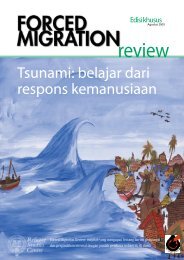FMR 42 full issue pdf - Forced Migration Review
FMR 42 full issue pdf - Forced Migration Review
FMR 42 full issue pdf - Forced Migration Review
You also want an ePaper? Increase the reach of your titles
YUMPU automatically turns print PDFs into web optimized ePapers that Google loves.
<strong>FMR</strong> <strong>42</strong><br />
Sexual orientation and gender identity and the protection of forced migrants 39<br />
and the gap between the legal provisions for<br />
protection and the facts on the ground is not<br />
generally recognised when asylum cases are<br />
evaluated by potential receiving countries.<br />
Kosovo may be knocking at the door of the<br />
European Union but it still has a long way to<br />
go in implementing human rights protection<br />
for LGBT people to a European standard.<br />
Agathe Fauchier agathefauchier@gmail.com is<br />
a lawyer who has previously worked with the UN<br />
and OSCE. This article is based on the opinions<br />
and experiences of an anonymous LGBT rights<br />
activist from Kosovo interviewed by the author.<br />
1. ‘On Constitution Writing: The Case of Kosovo’, Interview<br />
with Professor Louis Aucoin, 2008<br />
http://tinyurl.com/Tufts-Aucoin2008 Protection against<br />
discrimination on the ground of sexual orientation was also<br />
incorporated into Kosovo’s anti-discrimination law.<br />
2. Unknown people: The vulnerability of sexual and gender identity<br />
minorities and the Swedish <strong>Migration</strong> Board’s Country of Origin<br />
Information System, January 2010, EU European Refugee Fund<br />
http://tinyurl.com/Unknown-People-2010<br />
3. UNHCR 2010 The Protection of Lesbian, Gay, Bisexual, Transgender<br />
and Intersex Asylum-Seekers and Refugees<br />
www.unhcr.org/refworld/<strong>pdf</strong>id/4cff9a8f2.<strong>pdf</strong> para 1.<br />
City planning for sexual diversity: new policies in Bogotá<br />
Marcela Ceballos and Juan Carlos Prieto<br />
Bogotá is the primary destination of those internally<br />
displaced by violence in Colombia. The places of<br />
origin of the population displaced by violence are<br />
also the areas with the highest levels of violations<br />
of the rights of LGBT people, mainly transgender<br />
women 1 . Guerrillas and paramilitary groups direct<br />
violence against sectors considered to be opposed<br />
to the social order they wish to maintain since<br />
they see them as symptoms of ‘social decay’.<br />
The sectors they victimise include drug users,<br />
homeless people, individuals linked to prostitution,<br />
those living with HIV/AIDS, members and leaders<br />
of unions and community organisations – and<br />
homosexuals and transgender individuals.<br />
30% of displaced LGBT people now living in Bogotá<br />
cite the reasons for their flight as associated with<br />
their sexual orientation and/or gender identity. In<br />
the areas of Bogotá where displaced trans women<br />
tend to settle, there is widespread violence,<br />
sale and use of drugs, and trafficking of people<br />
for sexual exploitation – networks which are<br />
frequently linked with trans women and to which<br />
boys, girls and adolescents are most exposed. 2<br />
However, social mobilisation in these areas has<br />
been strengthening progressively for more than<br />
a decade, culminating in 2009 in the signature<br />
of Agreement 371 of the Council of Bogotá on<br />
LGBT public policy. This policy <strong>full</strong>y guarantees<br />
the equal rights of LGBT people and has two key<br />
aims: firstly, to guarantee services and assistance<br />
regardless of sexual orientation or gender identity<br />
and, secondly, to promote a culture free of violence<br />
on the basis of sexual orientation and gender<br />
identity. Relating to the first, for example, the district<br />
housing subsidy for the low-income population<br />
now recognises same-sex couples as a family unit<br />
with the right to benefit from this assistance.<br />
Implementation of this policy requires strengthening<br />
those organisations and leaders who have a role<br />
to play in supporting LGBTI rights. The authorities<br />
need improved information systems to monitor<br />
displacement due to sexual orientation and<br />
gender identity. The majority of trans individuals<br />
who arrive in Bogotá have low educational levels<br />
and tend to enter society in informal and transsexualised<br />
activities (hair and beauty, prostitution,<br />
tailoring, etc) with precarious working conditions;<br />
the network of institutions – such as community<br />
centres – which are responsible for catering<br />
to the specific needs of vulnerable groups and<br />
displaced people needs to be extended, and<br />
the social inclusion of these groups should be<br />
promoted through strategies for cultural change.<br />
Marcela Ceballos mceballos2000@yahoo.com<br />
is an adviser and Juan Carlos Prieto<br />
jprieto@sdp.gov.co is Director of Sexual Diversity,<br />
both in the Office of the District Planning<br />
Department, Bogotá. www.sdp.gov.co<br />
1. transgender person with a female gender identity<br />
2. <strong>42</strong>% of transgender women find it difficult to rent a home and<br />
27% are victims of violence at the hands of their partners. 100%<br />
of the transgender women surveyed had suffered some form of<br />
aggression or had been harmed by abusive or offensive sexual<br />
approaches. (Taken from Bogotá’s Baseline Public Policy for the<br />
Full Guarantee of Rights of LGBT, 2010.)




